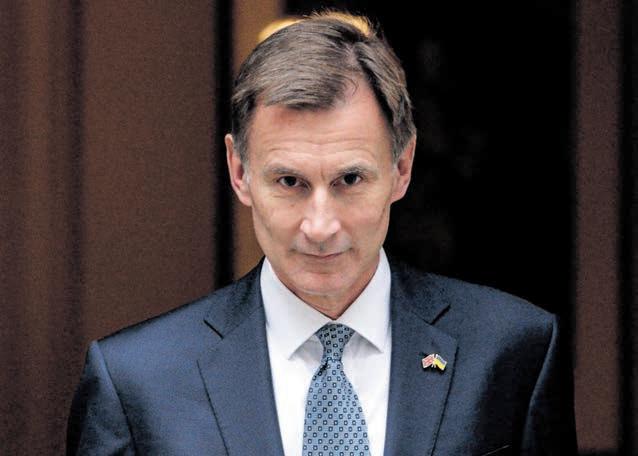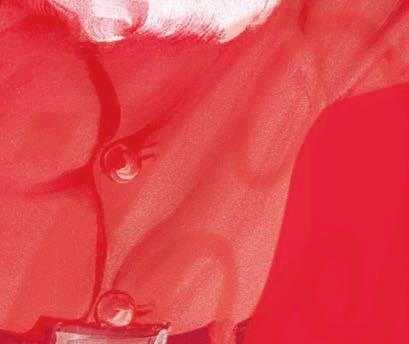RATE BUMPED UP BY 50 POINTS TO TACKLE INFLATION
JACK BARNETTTHE BANK of England yesterday sent interest rates to their highest level since October 2008, although it slowed the pace of increases to avoid unnecessarily intensifying a looming recession by heaping too much pressure on households and businesses.
Threadneedle Street’s monetary policy committee (MPC) voted 6-3 in favour of a 50 basis point rise to 3.5 per cent, a climb down from last month’s 33-year high 75 point jump.
The move was in line with market expectations and means the Bank has now kicked borrowing costs higher nine times in a row.
The announcement also comes around a year after the Bank’s first rise in this hiking cycle –
a 15 point move from a record low 0.1 per cent.
Governor Andrew Bailey (left), who voted for the 50 point rise, and the rest of the MPC have been forced to pivot from stimulative policy that has propped up the UK economy since the financial crisis to tightening aggressively to tame an inflation surge.

Despite the rapid scaling in rates, the Bank said there is “evidence” of workers demanding big pay rises and businesses hiking prices rapidly which could lead to “greater persistence” in inflation.
The Bank will “respond forcefully” if these upward price pressures stick around.

Prices have climbed 10.7 per cent over the year to November, among the hottest rates in four decades, although that is down from 11.1
per cent in October.
Economists now think the inflation surge has passed its peak.
The Bank and other monetary authorities are now stepping back from aggressive rate rises to avoid heaping greater than necessary pressure on households and businesses.
MPC members Dave Ramsden and Jonathan Haskel switched from voting for a 75 point rise last month to a smaller jump this month “point[ing] to an emerging broad-based consensus that the terminal rate is approaching,” Samuel Tombs, chief UK economist at Pantheon Macroeconomics, said.

Rate setters Swati Dhingra and Silvana Tenreyro wanted to keep borrowing costs unchanged, the first time any on the MPC have favoured sitting tight since the Bank’s first hike a year ago.
The ECB followed the Bank and US Federal Reserve in climbing down to a 50 point rise, but told investors to expect more such hikes in 2023.
THE
The



shut
The City’s Policy Chairman Chris
“City institution.”
“Its long history and deeply rooted status at the heart of the community means that it clearly meets the criteria for designation... something which must now be taken into account in any decision” on its future, he said.
Embattled Home REIT say they’re unclear on revenues on investor call
EXCLUSIVE CHARLIE CONCHIEBELEAGUERED property investor
Home REIT has admitted it has no idea how much rent it receives through government housing benefit payments despite saying its business model ultimately relies on them, City A.M. can reveal.
Home REIT, which invests in social housing for vulnerable
groups, has come under siege from investors over the financial health of its charity tenants, many of whom have signed 25 year leases with little financial track record.
The former FTSE-250 firm recently defended the stability of its rental income against attacks from short sellers, claiming it is “ultimately supported by central government funding and Local Authorities' statutory duty to house

homeless people”. However, City A.M. can now reveal the firm keeps no record of how much of its rent is actually covered by exempt housing benefit payments and how much is received via short term support from property developers, raising major questions over Home REIT’s grasp of its revenue stream and the ability of its tenants to service long-term leases.
On a call with investors on 7th December, heard by City A.M., Home REIT bosses said they “can’t provide an exact figure” on the proportion of income received through government payments and how much was paid for by the charity themselves.
In a separate call the following day, the firm was unable to clarify the source of its rent and how much came from “provisional rent cover”
provided by property vendors.
“The lease agreement that we have with the tenant entitles us to rent from day one,” Home REIT bosses said. “And whether that rent is received from rent cover or whether that money is received from local authorities coming across to us, we don’t have more visibility than that.”
STANDING UP FOR THE CITY
The one reason to cheer 2022 is the most important one of all
THIS COLUMN, in our first paper of 2022, banged an optimistic drum for the globe’s economic prospects. Coming out of Covid-19 restrictions and with a bucketload of pent-up demand, things looked rosy. It hasn’t quite worked out that way –a vast combination of factors has left us looking down the barrel of a 2023 that is unlikely to be all sunshine and light.

But that does not mean 2022 has
THE CITY VIEW
been entirely without bright spots. Indeed in a century’s time historians will not remember this year for rate hikes and energy bills, and Westminster’s political traumas will become nothing more than a pub quiz question. Instead, it will be remembered as
the year when the West stood up to the greatest threat to democratic freedom seen in decades.
We have got used to the idea that Russia invaded Ukraine –the war no longer bothers news bulletins, and even we have relegated the latest updates from the front page to what journalists call the ‘back of the book’. In truth it should have lived on page one throughout the year.
For all of the political storms on
both sides of the Atlantic, the West has –just about –stayed strong in its defence of Ukraine. The British public, to its eternal credit, still tells pollsters that they will accept higher bills for energy, bread and a hundred and one other items if it prevents Putin from winning his vicious war. That is something we should be proud of.
Everything we value on a day to day basis –the freedom to speak out, to work, to make money –is
threatened by autocrats like Putin. His fascist regime is anathema to everything the City stands for. It is of no use asking whether the Square Mile got too close to Putin’s cronies over the past decade –it is of value, however, to note that when it was time to stand up, the City, and the UK, and the West, did.

This is our last paper of the year - we’ll be back in January. Have a wonderful Christmas, and a happy new year.
Past the inflationary peak but hikes leaving a legacy
mortgage bump of around £3,000 next year when they refinance.
YAEL SELFIN, CHIEF ECONOMIST AT KPMG UK:


MARKETS were largely non-plussed by the Bank’s expected rate rise –but the question is what happens next amid growing fears of a yearlong recession. .
For many, the worry is that staff asking for wage hikes could embed inflation across the economy –meaning prices hikes stick around for longer, forcing the Bank to hike further and faster yet again. That would be news unlikely to be welcomed by homeowners, with four million Brits already expecting a
But the mood music across the world appears to be towards a gentlygently approach to getting inflation under control –after all, the economy is hardly running hot. The only central banker playing a different tune is Christine Lagarde at the European Central Bank, playing catch-up having moved slower than both the Bank of England and the Federal Reserve in hiking rates.
Here’s what some of the City’s most prominent economists made of the Bank’s decision yesterday.
While headline inflation is expected to continue to fall from the current peak, the fear for policymakers is that higher costs are yet to be fully passed on to core inflation, and that earnings growth is yet to peak. We expect the current tightening cycle to conclude in the first half of 2023, reaching four per cent. Following this, we could see the Bank adopting a wait-and-see approach, with no change to base interest rate as inflation gradually eases during the rest of 2023, and the full impact of higher rates feeds through to lower activity.
THE FINANCIAL TIMES
WINDFALL TAX PUSHES HARBOUR ENERGY TO SNUB NORTH SEA INVESTMENTS
One of Britain’s biggest oil and gas producers has said it would not enter the UK’s first exploration licensing round in nearly three years as it reviews its investments after the windfall tax.
THE TIMES
BANKERS
FEAR FOR BONUSES AS DEALS SLUMP
Bankers in the City of London and on Wall Street are bracing themselves for a drop in their bonuses as firms wrestle with a slump in dealmaking amid economic turmoil, after a surge in deals last year.
THE TELEGRAPH ROYAL MAIL VOWS TO IGNORE STRIKES AS THOUSANDS CROSS PICKET LINE
The leaders of Royal Mail have vowed to ignore striking workers as thousands cross the picket lines and support for strikes crumbles. Company leaders say they have built up a £1.7bn war chest.
WAIT-AND-SEE FROM BOE
MARTIN BECK, CHIEF ECONOMIC ADVISER TO THE EY ITEM CLUB:
The minutes of the meeting left the impression that rates are likely to rise further in the new year. But while financial markets see rates peaking above 4.5 per cent, the EY ITEM Club expects that Bank Rate will top out at no higher than four per cent.
Inflation has likely passed its peak and the EY ITEM Club thinks that the economy is in – or at least close to – a recession which should help to loosen labour market conditions and will increasingly bear down on inflation. The need to continue to significantly raise interest rates will soon fade.
PAUL
DALES, CHIEF UK ECONOMIST AT CAPITAL ECONOMICS:
Our view is that the majority of the MPC will want to see more concrete and significant signs that activity is weakening, the labour market is loosening and actual wage growth is slowing before calling time on the interest rate hikes. We don’t think those signs will emerge until after the next two MPC meetings in February and March. That’s why we think rates will rise by 50bps at each of those meetings to a peak of 4.5 per cent. That’s in line with current market pricing, but is a touch higher than the consensus forecast.

WHAT THE OTHER PAPERS SAY THIS MORNINGNURSE! NURSE! Nursing staff at hospitals across the country walked out yesterday on the first of two day-long strikes, with officials demanding a nineteen per cent pay rise
‘Tough’ times: Currys slashes profit forecast






 EMILY HAWKINS
EMILY HAWKINS
THE BOSS of retail bellwether Currys yesterday warned that the current “tough environment” showed little sign of disappearing in the short-term.
The laptop-seller yesterday slashed its full year outlook from an initial target range of £130m to £150m to a lower target of £100m to £125m.
It posted a group adjusted loss of £17m for the six months until the end of October, compared to a profit of £48m the previous year.





Currys said a £548m statutory loss was driven by a non-cash goodwill impairment of £511m, that arose around the time it merged with Dixons Carphone in 2014.
The impairment was mostly driven by increased discount rates as a result of the sharp increases in UK gilt yields around the end of the half-year.

It also pointed to a weakening in de-
















































mand for goods in its international markets due to smaller competitors clearing stock with discounted prices.


Alex Baldock, group chief executive, acknowledged the impairment was a “strikingly big number” but described it to journalists yesterday as a “technical accounting matter”.
On pricing, Currys was “certainly not saying we are going to be able to hold back the tide completely” on potential future inflationary increases, Baldock told City A.M.
The retailer had a “super clear” price promise to customers, with a pricematch guarantee if shoppers find a cheaper product elsewhere, he added.





Currys saw its share price tumble by over five per cent yesterday. Its share price has taken a hit to the tune of 47 per cent over the past year to date.
Currys had “missed the mark across the board,” City Index market analyst Joshua Warner said.




CHAOS AVERTED Ground handling staff at Heathrow call off 72-hour strike action

MEMBERS of the union
Unite working for aviation firm Menzies yesterday suspended a planned strike this weekend after receiving a new pay offer. Menzies said it hopes the revised deal will be accepted.
TSSA members accept Network Rail pay offer rejected by RMT
ILARIA GRASSO MACOLAPLATFORM staff at Network Rail yesterday got closer to ending their industrial dispute after members of union TSSA accepted a pay increase.
The union didn’t have any strike action planned after calling off its walkout planned for 17 December.
As part of the deal, Network Rail staff will receive a pay increase
between nine and 11 per cent in addition to job security until the end of January 2025. The same offer was accepted by the union Unite but rejected by the RMT.
Network Rail’s boss Andrew Haines called on RMT bosses to “put their members’ interests first” and end the dispute. The RMT was approached for comment. The news comes as No10 hits pause on anti-strike laws.
Fresh questions over Home REIT revenue stream
CONTINUED FROM PAGE 1
The admissions come despite a funding diagram provided by Home REIT pointing to exempt housing benefit as the key source of rental payment to the firm.
The revelations pose major questions over the sustainability of Home REIT’s business model when its charity tenants are forced to service leases without rent cover from developers.
Law firm Harcus Parker also alleged last week that some of Home REIT’s properties had been rejected for “exempt accommodation” status and would not be applicable for exempt housing benefits at all.
A spokesperson for Home REIT claimed that once the properties are “stabilised” the “income comes from exempt housing benefit”.
“In the period of ramp up of the property when residents are moving in, some of the income may come from the pot of money contributed by the vendor of the asset,” they added.
The firm’s share price has halved since the attacks by at least two short-sellers.
Watchdog hikes water price caps for businesses
NICHOLAS EARLSMALL businesses face a 6.4 per cent hike to their dual water and wastewater bills, Ofwat has confirmed after revealing its final decision on retail price caps.
Ofwat hopes the change in price cap rates will enable efficient retailers to earn a fair return, while supporting the long-term stability of the business retail market for the benefit of customers.

The watchdog has also decided to simplify price caps applying to smaller business customers by moving from the existing model of price caps varying on a regional basis, to an Englandwide national price cap.
This will ensure price cap rates are more reflective of the costs to serve smaller business customers, which Ofwat has concluded do not vary regionally.
The new price caps will be introduced from April 2023.
Ofwat will transition the introduction of the new price cap over a twoyear period, including limiting annual changes in customers’ retail charges to no more £60 per year before inflation.
Georgina Mills, business retail market director at Ofwat, said: “Our price caps ensure the business retail market is fair for small businesses that don’t shop around as much as much as larger businesses do.
“We need to make sure that these caps are at the right level, so that efficient water retailers can cover the costs of supplying their customers and small businesses don’t pay more than they should.”
Commenting on the hike, she added: “We have listened to feedback over the consultation period and carefully considered all views. We know that these are challenging economic times but the actions we’re taking today will support stability in the market, while continuing to protect smaller business customers.”
Hunt defends new generator levy in Downing Street showdown
NICHOLAS EARLCHANCELLOR Jeremy Hunt defended the introduction of a new tax on legacy electricity generators at a Downing Street roundtable this week.

Hunt told North Sea operators that the Electricity Generator Levy was justified with profits across the industry being well above levels prior to Russia’s invasion of Ukraine.
Aprentice star Kathryn Burn: Royal Mail strikes ‘nightmare’ for small businesses
EMILY HAWKINSAPPRENTICE star and small business owner Kathryn Burn has said the Royal Mail strikes are a “complete nightmare” for retailers and accused posties of being “almost greedy”.

Burn, who owns the My Christmas Pyjamas and Pyjamily brands, told City A.M. that protracted industrial action over retail’s ‘golden quarter’
had made her job “very, very hard”.
The matching pyjamas businesses have had to switch delivery providers to DHL and Yodel due to posties’ walking out this month, while also experiencing disruption to customers’ orders.
Staff at the postal service have gone on strike a number of times this month, most recently Wednesday 14 and Thursday 15 December.
Members of the Communication Workers Union (CWU) will also walk out on Friday 23 December and Saturday 24 December.



While Burn said she had “no problem with people striking,” she said the amount of strike dates “hasn’t been necessary”.
CWU boss Dave Ward said this week that he was “sympathetic” to small businesses being hit by strikes.
He believed it was right for the sector to contribute towards the generous energy bill support provided to households and businesses during these unprecedented times.
The Electricity Generator Levy is a temporary 45 per cent tax on extraordinary returns made by older UK electricity generators.
It will become effective from 1 January 2023.

OCTOPUS SIGNS DOGGER BANK DEAL WITH SHELL
Octopus Energy has signed a longterm deal with Shell to buy green energy from Dogger Bank, the world’s largest wind farm. It has agreed a power purchase deal with the rival energy supplier, which has signed agreements to offtake 20 per cent of the energy produced at Dogger Bank. The deal will provide up to 2.4TWh of wind energy to Octopus – enough to supply 24 per cent of Octopus’ customers with renewable energy. Dogger Bank is currently under construction off the North East coast of England and could benefit Octopus customers as early as 2024. It is a joint venture between SSE Renewables, Equinor and Vårgrønn. Once completed, it will be the world’s largest wind farm.
OFGEM UNVEILS
INVESTMENT PLAN
Ofgem has published its investment plan for transmission services designed to connect more renewable projects to the grid. The watchdog yesterday unveiled the Accelerated Strategic Transmission Investment framework, which streamlines the onshore transmission approval process. It is also designed to ensure robust consumer protection and to allow network infrastructure to be built faster. Ofgem has also released an update on its new pilot programme for Multiple Purpose Interconnectors, subsea electricity cables able to connect Britain to neighbouring markets and divert energy generated offshore back on land.
Burn said postal strikes had made running her businesses “very, very hard”




















Netflix banks on Meg and Harry to keep subscribers
NETFLIX is counting on the final three episodes of Prince Harry and Meghan Markle’s docu-series to give its viewership an end of the year bump.


The online streaming service, whose share price had declined by over 60 per cent by October, lost over 1.2m subscribers in the first quarter of 2022.
However, the streamer, which released the second half of its royal tell-all yesterday, is now hoping to cash in on the $100m deal it made with Prince Harry and Megan Markle back in 2020.
The first episode of the docu-series released last week was watched by over 2.4m people –the highest viewership ever recorded for a Netflix original.
The success of this series follows the critical and commercial success of The Crown, the multi-season fictionalisation of Queen Elizabeth II’s life and reign.
While Buckingham Palace has declined to comment on the claims made by the Duke and Duchess of Sussex in the docuseries, many Britons have been vocal on social media about their fury at Netflix and the couple, with some deeming its release disrespectful in the wake of Queen Elizabeth II’s death in September.
Simone Ferriani, a Bayes Business School professor, commented on the timing of the dou-series’ release.
According to him, for Netflix the “marketing of the couple’s content is working to perfection”.
The anticipated boost comes after the
company launched a new ad service package in November, offering streaming at a cheaper rate for users willing to watch adverts, in a bid to retain subscribers.
Netflix’s chief operating officer Greg Peters said earlier this year that he was confident that this new ad package could be the answer for the streamer.
Tiktok algorithms accused of pushing youngsters towards self-harm content
LEAH MONTEBELLOTIKTOK’s algorithms drive young people towards self-harm and eating disorder content within minutes, new research suggests.

According to a study from the Centre for Countering Digital Hate (CCDH), the video-sharing app is rife with dangerous content, including restrictive diets, suicide and self harm.
The campaign group found one youth account was shown suicide content within 2.6 minutes, and another was suggested eating disorder content within eight minutes.
A Tiktok spokesperson said: “This activity and resulting experience does not reflect genuine behaviour or viewing experiences of real people. We regularly consult with health experts, remove violations of our policies, and
provide access to supportive resources for anyone in need.”
CCDH urged governments to push forward with legislative action to address harmful content.
The Chinese-owned firm has also come into the spotlight over security concerns, with the US Senate this week passing a bill that bars federal employees from using the app on government devices.
Peters told reporters that the ‘Basic with Adverts’ option was about taking a “pro-consumer approach” rather than to “steer people from one tier to another”.

The more expensive option still exists for users who want to enjoy hits like Squid Game without adverts.

However, Netflix’s shares continued to tumble this week despite the new series.
NOT ALL FUN AND GAMES: MOBILE GAMING DIPS
The mobile games market is facing a dip in the coming year as the pandemic boom slows. Revenues are forecast to fall by 6.4 per cent this year to $92.2bn (£75.5bn), according to gaming data company Newzoo. This is a significant reversal from the 7.3 per cent growth mobile enjoyed last year and the 25.6 per cent rise in 2020.

The sector has faced supply chain issues throughout this year that has been further weighed down by poor performance in the US, China and Japan markets. Supply issues have also impacted the production and sale of the latest Playstation 5 console.
UK MAKES MOVES TO CLOSE DIGITAL DIVIDE
Ofcom’s latest report shows that nearly 70 per cent of the UK is covered by gigabit-capable broadband. This is an improvement from 2021 when only 47 per cent of the UK was covered by fast internet, with at least 12m homes now connected to full fibre broadband.
The report on the UK’s digital infrastructure showed a positive trend in network connectivity.
Outdoor 5G coverage is up to 67-77 per cent of areas from last year’s 42-57 per cent. Superfast internet in the country is defined as speeds of more than 24mbps. This coverage is up to 97 per cent. This comes after the government’s year long effort to tackle the digital divide.

Iwanted to start with a thank you to all the City AM readers that have flown through London City in 2022. There was a short spell, if you can remember it, at the start of the year when the prospect of travelling even across London, never mind across Europe or globally, felt like a distant prospect.
However, thankfully, once the Government gave the green light to travel again, we all soon got in our groove and took to the sky.
It was especially pleasing that business travel, that some naysayers had predicted would never recover, has not only returned, but returned strongly.
On our core business routes we have seen strong load factors, consistently. This speaks to the continued importance of doing work, making deals and innovating, face to face.
And we should also remind ourselves that making business to and from London quick and easy benefits the whole economy. Whether it’s spend on hotel rooms, lunches, conferences, or cabs, making London work well benefits us all.
Research we undertook back in May with WPI Economics suggested that a strong return to business travel could benefit the London economy alone to

the tune of £10 billion by the end of the decade.
This reflect that business travel isn’t a nice to do, it’s actually fundamental to London’s recovery in the short term and global status going forward.
For our part, we know we have to make flying as simple, pain free, and as sustainable as possible to continue to enjoy your custom.
That’s why, in 2023, we will be making a number of investments to de-
liver an award-winning airport experience.
From Easter, we will be one of the first airports in the UK to operate with a brand new, state of the art security system which will mean no more removing laptops or liquids from your carry on.
The current security requirements are cumbersome and slows everyone down, plus technology has moved on. With this new technology in place we
will actually be able to process more passengers and more trays than ever before, and the whole passenger experience will be much better.
I wouldn’t mind betting that once you try it, you won’t want to fly from any airport that doesn’t have it. We are also giving our departures area a major revamp. From next summer there will be more places to shop, more places to eat, more seats to sit in and, crucially, new toilets!
Combine all of that with the superfast, free Wi-Fi that we offer, then the airport will be an even better place to do a meeting before your flight, or to chill out.
However, we and our airline partners know that, with more eyes than ever on ESG reporting, we need to make flying more sustainable.
Whether flying domestically or across Europe, flying is more reliable, faster, and definitely more cost competitive than other modes.
But we need to help you justify it. Over the next decade, as you will have read in these pages, London City, because of our size and route network, will be at the forefront on making zero emission flight possible.
That may sound far off, but there are things happening in the short term which will reduce the emissions profile of flying from LCY; whether it’s through being a leader when it comes to sustainable journeys to our front doors via the TfL network, increasing the percentage of Sustainable Aviation Fuel used on our flights or, as we expect to happen in the next couple of years, our airlines investing in the newest, cleanest, latest generation aircraft.
Maybe our new year’s resolution should be to shout louder about how we are decarbonising. But be assured, making progress in this journey is important to us, because it’s important to you, and indeed everyone’s future.
For now, I wish all City AM readers a very Happy Christmas and prosperous new year. I’m looking forward to welcoming you to the airport in 2023 and making LCY everyone’s London airport of choice.

JP Morgan hikes forecasts for a reopened China
MILLIE TURNERJP MORGAN has hiked its growth forecasts for China, as the sudden rollback of its ‘zero-Covid’ policies paves the way for a brighter economy.
The US bank now expects China’s GDP to grow by 30 basis points to 4.3 per cent next year.
“The most important development in the past month is earlier reopening with a faster pace. Our analysis has taken into account a transitional pain period before the economy enters a strong recovery,” JP Morgan said.
However, fellow banking giant ING is less optimistic.
The loosening of restrictions in China is unlikely to be the silver bullet the economy needs, chief economist at ING, Iris Pang, said last
week, after the country announced the removal of its remaining covid rules.
“Moving from isolation facility quarantine to home quarantine will not increase retail sales significantly,” she wrote in a note.
“In short, economic growth in December and January will not be overly impressive.”

Chinese exports and imports dipped last month as zero-Covid took its toll
Apple iPhone supplier Foxconn yesterday announced it would ease restrictions at its largest factory in China.
However, factories are said to be bracing for a spike in cases after the easing of restrictions, with the country still struggling with low vaccination rates among the elderly.
Musk offloads another $3.6bn of Tesla shares angering investors
ILARIA GRASSO MACOLAELON MUSK has offloaded a further $3.6bn (£2.9bn) worth of Tesla shares, sparking anger among investors.
Musk announced early yesterday he had relinquished 22m of the EV giant’s shares between Monday and Wednesday.

The $3.6bn sale is the second time Musk has sold part of his stake in the company since the $44bn acquisition
of Twitter in late October.
The offload has sparked widespread anger among investors, who believe the chief exec is focusing solely on Twitter. IG Group analyst Tony Sycamore told Reuters the decision “didn’t put a lot of confidence in the business”.
Tesla’s share price continues to struggle, falling over 60 per cent this year.
Tesla was approached for comment.
UK POLICE SHUT HACKERFOR-HIRE WEBSITES

An 18-year-old has been arrested in Devon by the UK’s National Crime Agency (NCA) following a series of international raids that shut down 48 of the world’s top DDoS-for-hire websites. The FBI, NCA, Europol and Netherlands Police led Operation PowerOFF is seeking to tackle socalled ‘booter’ sites that offer DDoS attack services from prices of $10 to $2,500 a month. Authorities are now sifting through seized customer data in pursuit of those who administered the websites and used their tools and services. NCA cyber crime unit officer Frank Tutty said: “Users of these sites based in the UK have been identified and can expect a visit from the NCA or police in the coming months.”
UK SEEKS JAPAN SCIENCE DEAL AFTER EXITING EU
The UK is in talks with Japan for a deal for scientific collaboration, after snubbing the EU’s research funding programme when it exited the bloc. Science minister George Freeman told Bloomberg that while the government is still trying to get into the EU’s Horizon scheme, it is seeking alternatives. “If we can’t play in the European Cup of science, then we want to play in the World Cup,” he said. Freeman added that he believes the UK’s chances of regaining access to Horizon were improving, after Prime Minister Rishi Sunak mended relations with French president Emmanuel Macron. On Wednesday, the government unveiled a nearly £120m science research fund to encourage innovation.

WHAT DO YOU THINK IS THE ‘SECET SAUCE’ FOR EFFECTIVE DEALMAKING IN THE CURRENT MARKET CLIMATE?
Irrespective of where VC and PE GPs engage in a company life cycle, they should be looking critically at their value proposition, be it in operations, fundraising or product design. A sector or investment hypothesis may be trending but we believe ensuring and financing strong fundamentals is still central to effective dealmaking.

OUT OF THE VENTURE CAPITAL AND PRIVATE EQUITY FIRMS OUT THERE, WHAT DREW YOU TO PICUS CAPITAL?
What stood out to me was the way Picus actively engaged with their portfolio companies. They often started working 3-6 months with founders pre company incorporation. It was clear that operational robustness and commercial viability were at the core of Picus’ thinking. From Day 0, they considered how a business model remains resilient and adapts effectively to different environments.
Their commitment is clearly evidenced by the longevity of the relationships they enjoy with founding teams and the fundraising success they have achieved to date.
Indeed, tech headlines are showing layoff notices and recruitment consolidation efforts. Industry conversations are zooming in on the volatility of venture capital and private equity, and whether it should continue to be a part of investors’ allocation strategy in 2023.
At Picus, we are responding by dou-
bling
longer or completely forgoing IPO. Yet, one reality has remained unchanged from the unprecedented valuations and fundraising levels of 2021. Sectors like democratized access to financial services, AI infrastructure and renewable energy transition will con-

tinue to need financing to transform and disrupt at critical mass. Therefore, it is imperative to ensure portfolio companies are sufficiently financed to manage cash flow and can operate efficiently at a smaller scale before growing.
By starting to work with our portfolio companies so early and in a hands-on manner, we at Picus have the visibility to see how companies will evolve and the greater potential to shape key developments along the course of that company’s evolution. This includes doubling down on those that show potential to be category leaders in their respective fields.
Ultimately we are in the business of being a long-term strategic partnerworking with companies to be at the forefront of change and stand the test of time.
To read the full interview, please scan the QR code.
Picus Capital is a global venture capital firm and invests in early-stage technology companies. At the heart of its investment philosophy is being an entrepreneurial sparring partner to its portfolio companies and building in resiliency into the disruptive technological infrastructure that their business models support.

CONSIDERING ALL THE MARKET DOWNTURNS , WHICH AFFECT TECH VALUATIONS, WHY SHOULD INVESTORS KEEP PUTTING THEIR CAPITAL HERE?
DATASITE: Joanna Koczuk, Head of Investor Relations & Fundraising at Picus Capital shares her insights on creating long- term value in the VC space
down even more on our core investment hypotheses of building and investing in resilient tech infrastructure. Challenges to public equity performance globally may continue into next year and we are still observing more companies staying private for
LET’s not forget that inflation was already a problem heading into 2022. The final inflation reading of 2021 was for November and came in at 5.1 per cent, nearly three times higher than the Bank of England’s two per cent target and the highest level since September 2011.
The initial price burst was driven by supply chains wilting under the weight of a sudden burst in demand after pandemic restrictions were scrapped.
Oil and gas costs also climbed due to countries competing fiercely for inventories to power their economies back to full strength.
Despite price pressures heating up, Bank of England governor Andrew Bailey famously marched markets up a hill only to send them back down again at the November meeting when he and the MPC kept interest rates at a record low 0.1 per cent.
Loose monetary policy supported demand. Consumers and businesses were able to borrow at record low rates until December 2021 when the Bank tightened (just 15 basis points) for the first time since 2018.
At that meeting, the Bank said it was committed to focusing on medium term inflation pressures “rather than factors that are likely to be transient”.
Well, those “transient” factors sent inflation this year to a high of 11.1 per cent, a 41-year record, although this week’s 10.7 per cent figure sent a signal that it has now passed its peak.
Nonetheless, the UK is clearly headed into a long (albeit shallow) recession lasting at least a year that the Bank thinks could shave nearly three per cent off GDP.
How did the country get here?
Supply chain pressure at the beginning of 2022 was gripping businesses.
The average cost of shipping goods was running at more than $9,000 per 40 foot container in early January, up from an average of about $1,300, according to Freightos’s Baltic Dry Index.

Households splurged on electronics and other durable goods while locked up in their homes. While spending patterns partially returned to normal in the early months of this year, demand for physical products which the UK imports a lot of remained high.
As a result, supply chains “couldn’t really cope,” Alpesh Paleja, lead economist at the Confederation of British Industry, told City A.M.
Ongoing lockdowns in China clogged up key trading arteries. Shortages followed, for consumer goods and raw materials, “harming production and sales at the same time as adding

THE YEAR THE UK ECONOMY SOURED 2022 £

The same cannot be said of the disaster that was British fiscal policy in the late summer and autumn.
The mistakes of Liz Truss’s mini-budget have been well catalogued. Launching unfunded tax cuts would have boosted household and businesses’ finances. But, doing so at a time when inflation is running at a 40-year high was reckless.
Similarly, now Chancellor Jeremy Hunt’s decision to hike taxes and cut spending by £55bn in last month’s Autumn Statement when the UK is headed into a recession is not the typical textbook response.
The most effective policy mix is probably somewhere in the middle.
Nonetheless, between Truss’s minibudget on 23 September and Hunt’s statement on 17 November, UK fiscal policy underwent a £100bn swing.
Truss’s decisions will undoubtedly have the most immediate damaging impact on the UK. Banks were forced to raise mortgage rates after gilt yields fired higher on Truss’s borrowing splurge.
“For those households that had to refinance their mortgages in the immediate aftermath, this will have clearly exacerbated the squeeze on spending power,” Horsfield said.
This week the Bank predicted around for million homeowners will have to absorb a £3,000 jump in their mortgage bills next year.
A combination of higher prices, taxes and mortgage rates eroding pay growth, which is running at nearly seven per cent in the private sector, far above the long term trend, will drive the coming recession.
Essentially, what hit the country in 2022 was this: “A large terms of trade shock that [has pushed] inflation to its highest rate in 40 years and [driven] historic falls in real household disposable income,” the OBR summed up nicely. 2023 will be the year of the slow burning real income squeeze and recession. Buckle up.
to input costs,” Sandra Horsfield, economist at Investec, told City A.M.
Businesses responded to swelling costs by rising prices, although Dean Turner, chief eurozone and UK economist at UBS Wealth Management, said Brits were “willing, and able, to absorb higher prices”.
In February, UK inflation topped six per cent. And then Russia invaded Ukraine on 24 February and everything changed.
The human tragedy of the war will top any economic costs. But Putin’s decision to send troops into Kyiv has turbocharged inflation everywhere.
Gas prices skyrocketed on fears Russia would suck supplies out of the market in response to western sanctions to freeze Putin out of the financial system, which happened.
Oil prices jumped partly due to weaker Russian supplies and countries hoovering up alternative energy sources to replace gas.
Energy costs have been pegged back by imports of liquified natural gas imports replacing Russian supplies, un-
usually warm weather curbing demand and China sticking to zeroCovid, although that may be coming to an end.
Nonetheless, the energy price surge has raised UK import costs, while the price of exports has not climbed as much, resulting in what economists call a terms of trade shock.
“We are now paying more for goods we import, especially energy. Incomes are rising at a rate slower than inflation. We are, as a country, poorer as a result,” Turner added.
While the war has made us poorer, “we shouldn’t lose sight of the fact that the UK economy was not in a position of strength even as the conflict was brewing,” Frédérique Carrier, head of investment strategy at RBC Wealth Management, told City A.M.
Inflation in the UK climbed 2.8 percentage points from February to April to nine per cent from 6.2 per cent.
Policymakers were unable to mute the impact of the aforementioned factors that have buffeted the UK economy this year.
ANNOUNCEMENTS LEGAL AND PUBLIC NOTICES
CITY of LONDON

The PLANNING ACTS and the Orders and Regulations made thereunder This notice gives details of applications registered by the Department of The Built Environment
Code: FULL/FULMAJ/FULEIA/FULLR3 – Planning Permission; LBC – Listed Building Consent; TPO – Tree Preservation Order; OUTL – Outline Planning Permission
22/01117/FULL


Shopfront alterations comprising of the replacement of 1 no. glazed door with a new steel security door.
22/01155/FULEIA
Partial demolition of existing building (Gracechurch Street frontage adapted) and the erection of a 32
or telephone 020 7332 1710.
Any observations must be received within a period of 21 days beginning with the consideration of this application.
In the event that an appeal against a decision of the Council proceeds by way of the

THE YEAR THAT WAS
THE DR. PEPPER AWARD
Liz Truss and her Chancellor Kwasi Kwarteng delivered a mini-budget full of goodies that, ordinarily, the City of London would have loved.

Unfortunately, they did it at the worst time possible –after bunging £60bn on a plan to keep us all warm this winter –and acquainted us all with the exciting world of the LDI fund. London’s economic meltdown lasted for a few days –much like Liz Truss’ premiership, which conked out after just shy of seven weeks. Britain’s third Prime Minister of the year, Rishi Sunak, has done his best to restore market confidence, but has so far done little for his party’s polling numbers.
FORECAST OF THE YEAR AWARD
The Bank of England continued to use the word ‘transitory’ to describe inflation at the start of the year, with their February monetary policy report warning that price hikes might end up “around seven per cent” in spring before falling back. Of course, it hit more than 11 per cent by the end of the year, and the Bank’s failure to get ahead of inflation helped put sterling on a log flume throughout much of the year. Mercifully, Andrew Bailey et al seem to have got their heads around the issue now. Whether mortgage holders are so thrilled is a different question.
THE WHO WOULD HAVE THOUGHT AWARD
Called ‘Hairy Plotter’ by the New York Post, Sam Bankman-Fried’s decline from cock of the walk to, err, something else, was swift. FTX’s collapse will surely push politicians and regulators to get a handle on the crypto industry –and persuade celebs to be more careful on their partnerships.

THE DON’T SAY THAT AWARD
Early in 2022 Vodafone chief exec Nick Read told investors that the whole telecoms industry was going through shareholder destruction thanks to there being too much competition.


Vodafone’s share price understandably took another beating thanks to the boss offering a sell-side thesis, and Read was out the door by the end of the year.

We started the year with Boris Johnson in Downing Street and optimism for a Covid-19 rebound. It didn’t quite turn out that way - and here’s our pick of the best of the best (or worst of the worst) of 2022
THE MUM OF THE YEAR AWARD
This year hasn’t been smooth sailing for e-commerce retail group THG. But, at least founder Matt Moulding can be assured that his family has his back. Moulding’s mother emailed The Sunday Times columnist Oliver Shah to criticise media coverage of the retailer’s torrid share price performance. “You must lead very dreary lives in your dead-end jobs,” she said.
THE BAD ENERGY AWARD
Ovo Energy was forced to apologise in January after it advised customers to do star jumps, cuddle pets and eat porridge to cut down energy bills and stay warm. But the winner –by a distance –is HSBC, forced to apologise after the advertising regulator took aim at their environmental claims.
THE U-TURN AWARD
After boosting his stake in Twitter in April, Elon Musk said he would be buying the social media firm for a whopping $44bn. He later backtracked on this move, moaning about the bot count and claiming he had been misled during the deal process – kicking off a major legal battle with Twitter. The Tesla founder then changed his mind AGAIN, stating he WOULD be buying the company for the original price. Since then, it’s been... well, you know.

THE SAM BANKMANFRIED MEMORIAL ‘I F**CKED UP’ AWARD
Corporate scandals and blunders continued in 2022, serving up a whole host of nominees for this award. It was recently revealed that Softbank CEO Masayoshi Son personally owes the bank $5bn because of losses on the lender’s tech bets. “Hold my beer,” says founder of Archegos Capital Management Bill Hwang. The Archegos founder lost some $20bn in a matter of days. He has since been hit with multiple fraud charges, with the US SEC alleging that he “propped up a $36bn house of cards by engaging in a constant cycle of manipulative trading, lying to banks to obtain additional capacity, and then using that capacity to engage in still more manipulative trading.” If there was one big f**k up this year, we think Hwang wins this award comfortably.


CITY DASHBOARD
ONE-STOP SHOP FOR BROKER VIEWS AND MARKET REPORTS


LONDON REPORT BEST OF THE BROKERS

FTSE 100 marks worst day in two months after Bank rate hike
THE FTSE 100 recorded its worst day in over two months yesterday after the Bank of England (BoE) raised interest rates by a widely expected 50 basis points and joined other major central banks in predicting that more rate hikes were likely.

Wall Street indexes and European stocks fell sharply after the Federal Reserve and the European Central Bank hiked rates by similar amounts and signalled that there would be more to come as they battle spiralling inflation.
The BoE’s rate-setting committee voted 6-3 to raise Bank Rate to 3.5 per cent –its highest since 2008 –from 3.0 per cent as it eyed the risk of persistent inflation pressures, even with a looming recession and hopes that inflation might have peaked when it hit a 41year high in October.

The blue-chip FTSE 100 closed the session down 0.9 per cent with the biggest percentage drop since October 11, while the midcap FTSE 250 slid 0.8 per cent.
“It’s not really the story of rate hikes being materially different in the UK.

The perception of where the bank rate gets to is similar to where it was. In that regard, there is no material impact on equities,” said Vivek Paul, UK chief investment strategist at Blackrock Investment Institute.
“The bigger question –are current prices fully reflecting the damage that we’re likely to see on account of there being a recession that is on the horizon.”
The pound dropped 2.0 per cent as the BoE’s announcement revealed a widening split between policy members, darkening the visibility on future rate hikes.
Rate-sensitive banks fell 1.4 per cent, with HSBC down 1.0 per cent.
CITY MOVES WHO’S SWITCHING JOBS

 TIKEHAU CAPITAL Alternative asset manager
TIKEHAU CAPITAL Alternative asset manager

Tikehau Capital has poached a director from consumer goods giant Unilever to co-lead its private equity regenerative agriculture practice.
Laurent-David Charbit, who first launched his career in supply chains at Michelin before joining McKinsey, has spent the last 12 years at Unilever.
Peel Hunt upped its target price for DS Smith yesterday from 375p to 450p as it backed its 2023 performance amid macroeconomic uncertainty. It comes as box volumes are set to improve for the second half of the year for the packaging titan, energy costs are hedged out and the margin increase reflects the strong pricing model, with “more to come”. The broker gave the stock a buy rating.
KIND
Peel Hunt reiterated its buy rating yesterday for Serco Group after its 2022 guidance increased once again. It said that 2022 was likely to turn out far better than Serco had intially expected at the start of the year as strong growth across the business largely replaced Covid-19 contracts. The broker backed its target price at 217p for the FTSE 250 firm.
Based in London, Charbit’s hire forms part of the firm’s efforts in supporting its private equity impact platform.
“We strongly believe that our regenerative agriculture practice strategy is well positioned to accelerate the paradigm shift towards a more resilient agri-food sector,” head of private equity Emmanuel Laillier said. “We wish Laurent-David all the best in his new role.”
TASKSIZE
IT firm Tasksize has snagged a former Morgan Stanley director to head up its business development division.

James Pike, who most recently held the role of global head of institutional client services at Morgan Stanley,

leaves the US investment bank after 17 years, within a number of positions.
Based in London, Pike brings over 24 years’ worth of industry experience across securities and derivatives, including post-trade operational activities.
“James’ previously held positions make him a valuable source of insight and experience,” CEO Philip Slavin said. “James is well positioned to advise on strategy and increase our presence.”

SAVILLS
Savills has bolstered its central London office agency team with a fresh surveyor, based out of the firm’s
Margaret Street head office.
Isaac Begley joins from within commercial property manager Acorpp’s Australian division, where he spent three years.
Begley is set to work closely with the landlord and tenant representation central London teams to advise on the disposal and acquisition of leasehold office premises in West End.
“We are keen to build a team underpinned by a variety of experiences, perspectives and insights. Isaac brings with him exactly this and so we are extremely pleased to welcome him into our expanding team,” head of the West End office agency team Hunter Booth said.
GOTTA BE CRUEL TO BE
“Central bankers have a difficult job to do at the best of times, and right now is far from the best of times. Taking more money out of people’s pockets is a blunt tool but it’s the one the Bank of England has to work with.”
DANNI HEWSON, AJ BELL
The pandemic threw scientists into the limelight but not the scientific process
Richard HortonIT IS hard to believe that last week marked two years since the first person in the world received a licensed Covid-19 vaccine. Many hailed the pace at which the vaccine was developed. But behind this scene of unprecedented success lay an intricate network of researchers, scientists, and healthcare professionals, collaborating globally to deliver a breakthrough that saved millions of lives.
Two years on, we are still feeling the effects of Covid-19, but we’ve also been tackling outbreaks of resurgent viruses and bacterial diseases such as Mpox and Strep A. The scale of the Covid-19 pandemic taught us some hard lessons, but unless we act on those now, we will remain poorly prepared for coming health emergencies.
With the likes of Chris Whitty, Chief Medical Officer, and Patrick Vallance, Chief Scientific Advisor, turning into overnight celebrities with their daily Covid-19 briefings, the pandemic changed how scientists were perceived by the public. They were emblematic of a new era in which science and scientists are front and centre in the public eye. A recent report by the Economist Impact, a policy research team within The Economist Group, supported by The Lancet’s publisher El-
sevier, surveyed over 3,000 scientific researchers globally. It found that although scientists recognised a welcome increase in public attention on science thanks to the pandemic, this awareness was not always matched by enhanced public understanding.
During the pandemic, it seemed that scientists were blamed for changes in policy and the general feeling of confusion about how to manage the rapid spread of a new coronavirus. To meet the demands of the pandemic, scientists had to forgo important elements of the research process, such as peer review, a crucial method of quality assurance that invites scrutiny of research
by other experienced researchers (peers). This process, unsurprisingly, takes time, but without it we remove an important check and balance that helps ensure that findings can be relied upon by the public, media, and policymakers.
Public understanding of the iterative nature of science was also poor. New scientific findings are always provisional. “Facts” can change as new evidence is gathered and accumulated. Those outside the scientific community can sometimes find this uncertainty hard to accept, and for good reason. The public wanted black and white answers during the pandemic. But science is often grey. And when sci-
entific advice did change, this was often met with criticism, or even alarm. The long-term effect of this might well be an increase in the mistrust of experts. Scientists have to do better and turn the tide through improved public understanding.
This much more public-facing role for scientists is now here to stay, which brings extreme challenges for researchers. Now it’s about using social media to reach the public, policymakers, and the media. But this means tackling misinformation – according to the Economist Impact’s report, a quarter of academics (23 per cent) now see publicly countering misinformation as one of their primary roles in so-
ciety, compared with just 16 per cent who said this was the case pre-pandemic. Social media exposes scientists to an avalanche of abuse, with 32 per cent of those surveyed saying they had personally experienced, or knew a close colleague who had experienced abuse after posting their research online. But what does this ultimately mean? Researchers are nervous about using social media - just 18 per cent said they were confident communicating their research on social media. The public, media and policymakers need to be better informed about how the scientific and research process works. There is an opportunity for us to do this now, which wasn’t possible during the height of the pandemic. Researchers need to be supported to improve their communication skills when engaging with the public and policymakers. We must pour investment into building public trust in science, campaign to counter misinformation, enhance research literacy among the media, commission more research on science communication, make vigorous efforts to explain new research findings to a public audience, and prepare scientists for more public-facing roles.
There presently exists extraordinary and dangerous complacency among many scientific bodies about the lessons of Covid-19. The attitude seems to be, “well, we developed effective vaccines in record time, didn’t we, so what is there to complain about?”. The future has to look brighter for scientists; otherwise, it can’t look brighter for us.
£ Richard Horton is Editor-in-Chief of The Lancet
Unicorn status is no longer the holy grail of success for start ups in the UK and Europe
AFTER several record breaking years for the European startup ecosystem, 2022 marked a new, more volatile environment. While brilliant businesses are continuing to raise funding, this is happening against a backdrop of postponed IPOs and decreasing valuations.
As we navigate this new landscape and valuations fall (the most headline grabbing so far include Klarna, which saw an 85 per cent valuation drop), we are confronted by the question of whether we should rethink our evaluation of startup success. Should we still value “unicorn status” when measured against the current macroeconomic picture?
Since the term was first coined in 2013, unicorn status (reaching a $1bn valuation) has become a pinnacle of startup success. There are currently 194 privately held unicorns in Europe, many produced in 2021 when record levels of venture investment were flowing into the continent.
This growing crowd marked distinct
Annalise Dragicscribe as unicorn complacency. No longer such a rare beast, buzzy startups were almost expected to reach billion dollar heights. Perhaps predictably, attention during the 2021 European tech boom turned to decacorns - those with a $10bn valuation - as the new marker of real success.
individual and collective success; offering clear confirmation that UK and European tech is continuing to rapidly mature. However, the lustre of the unicorn status may be fading.
This can be attributed to two main, (potentially conflicting), drivers.
Firstly, the last few years saw such a rush of capital into UK and European markets that the unicorn herd became a stampede. This pace meant we became accustomed to companies raising major VC rounds and hitting unicorn status quickly. Virtual events platform Hopin sprinted from launch to £1.37bn valuation in just 13 months.
This sparked what some might de-
It feels like the “mainstreaming” of unicorn status did the title a disservice. Reaching a $1bn valuation is an incredible achievement only a small sliver of startups ever reach. Despite the outsized attention this small fraction of start-ups receive, they remain an elite club.
The second dent in unicorn prestige was made at the beginning of the current tech market cool down. Against the backdrop of new economic realities, valuations are being recalibrated. VCs and start-ups alike are watching closely as numbers settle. Some who once held unicorn status are falling out of the club.
This combination of intense acceleration in unicorn numbers, followed by a sharp market correction, has led some
to champion other mythical beasts as the marker of “true” success. Proponents of the “centaur” label - which is bestowed when a business hits $100m in ARR - argue it’s a more accurate measure of success when cash is king and valuations are a moving target. And technology companies generating significant revenue may be in a much stronger position going into what looks likely to be a global recession.
As a tech community, we should do more to celebrate companies that reach $100M ARR and those that - gasp - also build profitability from day one. That said, we should continue to celebrate our unicorns too. Scaling a company from scratch to a valuation of $1bn should not be downplayed. It might even mean more in the current landscape of shifting valuations.
Now may be the time to add more nuance to our success benchmarks, but we don’t need to sweep away existing ones.
£ Annalise Dragic is VC Partner at Sapphire Ventures

BIG BUCKS FOR BORIS
For anyone who had to listen to Boris Johnson every week at PMQs, the idea of paying him to speak feels pretty insane, but the former PM has raked in £1m since leaving office. He has made speeches to investment bankers in the US and news organisations in India for over £200k a pop


LETTERS TO THE EDITOR
A whole new world of forex
[Re: UK banks face wave of ‘exotic’ forex derivatives claims after collapse of Pound, yesterday]
Businesses, which were scrambling to protect their bottom lines against the dollar’s record highs and the euro, pound and yen’s record lows, have been let down by traditional banks.
This “wave” of “exotic” forex derivatives highlights that despite fierce fintech competition, banks are still up to their old tricks of chasing down profits at the expense of their customers. This can have dire consequences, particularly for smaller businesses on tighter margins. One bad hedge or backfiring derivative can leave them in the red.
Genuine partners would advise the majority of businesses to keep it simple
when it comes to hedging. It shouldn’t be about taking advantage of market volatility but should be used as a security mechanism allowing business to lock in rates ahead of buying and selling goods and services to bring certainty to the currency chaos.
Vanilla FX products are growing in popularity as they offer security but also flexibility in that they are easier to unwind if the market moves against you or risk appetite changes. Exotic derivatives, on the other hand, are complex instruments which are difficult to sell to others as there isn’t as big a market and can lead to bigger losses than not hedging at all.
Stories like this will continue to push businesses away from traditional banking partners towards fintech partners which can offer more flexibility and have their customers’ interests at the heart of their business.
Descout NeoBig tech’s year of rough seas has taught us a lesson in naming winners and losers
Leah MontebelloEXPLAINER-IN-BRIEF: BRITAIN NEEDS TO UP ITS GAME ON GREEN JOBS
The UK risks losing out to competitor businesses in Europe, America and Asia, unless it heavily invests in factories for green technology over the next five years, according to analysis by think tank Onward. Nearly 250,000 jobs are at risk in carbonintensive industries in Red Wall seats. In order to boost renewable energy and electric vehicle manufacturing in these areas, there will need to be significant re-skilling programs, the report said.
The Conservative Party is increasingly concerned about its
ability to hold onto constituencies in the North, with a handful of MPs resigning from politics.
The report, backed by over 20 Conservative MPs including Simon Clarke and Andrea Leadsom, recommends tax breaks for green factories and a copycat model of the cash incentives offered in the US and the EU to build "gigafactories". Both the EU and the US are in a trade war of sorts because of state aid rules for climate friendly companies, with Joe Biden offering significant tax incentives.

St Magnus House, 3 Lower Thames Street, London, EC3R 6HD Tel: 020 3201 8900
Email: news@cityam.com

Certified Distribution from 30/5/2022 till 01/07/2022 is 79,855
IF 2022 has taught us anything, it has shown us how there are no clear business winners or losers from the pandemic. The rough year for big tech is a case in point.
Although many of the Faang (Meta neé Facebook, Apple, Amazon, Netflix and Alphabet) cashed in on the various lockdowns, this year has sparked a dreadful change of tune for some of the world’s biggest companies.

Silicon Valley has had to grapple with supply chain woes, and then the cost of living crisis, tightening consumer and commercial spend, as well as a war in Ukraine coupled with a wider economic downturn (and subsequent tech sell off). The fateful mix has meant in the past few months alone, Meta, Snap and Amazon have all made thousands of staff redundant, cutting teams and pulling major projects.
Twitter also famously gained a new owner, Elon Musk, who is on a quest to completely reinvent the social media firm, cutting half of its headcount in the process.
From a video streaming perspective, the year has been equally uncertain, with Netflix having one of the famous tumbles of this year, raising question marks for the entire sector as its share price dropped to as low as $162.71 down from its $690 in 2021.
As we head into 2023 the general consensus is that firms will need to tighten their belts and go back to basics. Tech analyst at PP Foresight Paolo Pescatore called this a much-needed “reality check”, with companies pausing bigger, more expensive projects, and “going back to the drawing board”.
Meta lost over $9bn to its Reality Labs bets on AR/VR technology in the first three quarters of this year, with even Facebook chief Mark Zuckerberg conceding that he made a mistake in going full force with the metaverse. Snap and Amazon have also reportedly culled their innovation teams in a round of brutal cuts.
Victoria Scholar of Interactive Investor told City A.M.: “Tech companies will need to focus on managing costs with efficiency programmes and maintaining sales where possible. This may mean that resources are streamlined towards the more lucrative business segments, with less room for spending on ‘moon shoot’ ideas.”

However, perhaps all is not lost for innovation. One insider at a Silicon Valley social media firms told City A.M. there are concerns that all this newly available talent, including highly talented AI designers and developers, could band together to work on a new project or rival.
Climbing interest rates and a slowing economy are likely to make start-up fundraising difficult but the social media space is famously fickle. Relatively new players like Tiktok have been able to gain traction quickly.
Although Pescatore agreed that there are currently too many companies chasing too few dollars, “the concentration of Silicon Valley brings people together”, and wouldn’t rule out a new player to challenge the status quo.
Squeezed ad budgets is the elephant in the room, and has been a point of contention for the likes of Google and Meta month after month - meaning revenue streams continue to fall short of expectations.
Pescatore said the likes of Tiktok, which is owned by Bytedance, have been clever in this way - exploring opportunities in live sports and experimenting with live shopping, and other formats that may appeal to Gen Z and
ultimately get advertisers in.
Equally, Apple continues to be an outlier, whose privacy changes have actually further hurt advertising budgets - by making more difficult for app tracking on users by giving them a pop-up to opt out (thereby reducing ads).
Even the so-called winners of the pandemic cannot hide from the regulatory obstacles popping up. The EU passed its Digital Markets Act and Digital Services Act in October and the UK continues to push forward with its online safety bill.
For Pescatore, these are “major headaches” but social media analyst Matt Navarra said meeting regulatory standards will need to be a bigger part of how companies operate.
“They (regulators) will be keen to show these companies that they aren’t just here as guidelines and rules, but that these regulations will have implications,” Navarra told City A.M.
And the coming year could be a turning point as regulators flex their muscles. So whether Brussels goes on a full defensive, or if Meta and Twitter alumni band together to build something, one thing seems for certain: it’s going to be a bumpy ride.
Distribution helpline If you have any comments about the distribution of City A.M. please ring 0203 201 8900, or email distribution@cityam.com
Our terms and conditions for external contributors can be viewed at cityam.com/terms-conditions
Printed by Iliffe Print Cambridge Ltd., Winship Road, Milton, Cambridge, CB24 6PP
Editorial Editor Andy Silvester | News Editor Ben LucasPETROL HEADS New car registrations up 23.5 per cent this year in the UK
GOING OUT
EDITED BY STEVE DINNEEN @steve_dinneenFILM
AVATAR: THE WAY OF WATER
DIR. JAMES CAMERON BY JAMES LUXFORDThe sequel to the most successful film of all time comes out this week, but despite very little competition at the multiplex, the hype has been muted. For years, Avatar has gained a reputation as an anomaly: the most successful film no one remembers, it’s rarely in any best-of lists, or even talked about when mentioning classic scenes or quotes.
That should concern James Cameron and Disney, who have devoted 13 years and a reported $1billion for four planned sequels. So, can Cameron recapture the magic of 2009, or will this be remembered as his first real dud?

The film returns to the distant planet of Pandora, where Jake Sully (Sam Worthington) has lived with his partner Neytiri (Zoe Saldana) after transferring from his human form to his Na’vi avatar. In the time since the first film, they have raised three children – two sons, a daughter, and an adopted teenager named Kiri (Sigourney Weaver). After an attack from a Na’vi clone of Colonel Quaritch (Stephen Lang), Jake takes his family from his home in the jungle and hides out with the water tribe of Metkayina where they strug-
gle to adjust. Their problems, of course, have a way of following them.
Cinema is undoubtedly a visual medium, and in that sense The Way of Water is a resounding success. While the press screening’s High Frame Rate 3D was jarring, there’s no denying the level of detail that’s gone into both the original locations and the new areas of Pandora.
Cameron’s lens sweeps over the vast landscapes, encouraging you to drink in every pixel. From a technical standpoint, it’s clear where the money and time have gone.
It’s impressive, for a bit, but the film flounders when confronted with the need to tell a story. Effects can only go so far, and the Oscarwinning director is far more interested in showing you his sandbox than doing anything interesting with it. Put simply, it’s a dull mix of the original story with even duller right-of-passage subplots. It’s hard to invest in the children of characters

you weren’t invested in last time around, and it’s hard not to giggle at scenes like Lo’ak, Jake and Neytiri’s second son sharing trauma stories telepathically with a giant fish.
It’s difficult to feel much from performances filtered through emotionless computer animation but a couple stand out. While Lang is essentially doing the same thing he did last time (and is introduced in a way that removes any jeopardy from future films), his gung-ho energy breaks up the po-faced tone. He’s accompanied by Spider (Jake Champion), a human raised on Pandora who looks a bit like Disney’s Tarzan and has a peculiar arc in terms of loyalties.
Sigourney Weaver has the most emotional journey as Kiri, although the 73-year-old playing a teenager still feels strange. As for Worthington and Saldana? These broadly drawn characters don’t seem to have developed at all. Jake still fills the plot with questionable leadership decisions, while Saldana’s Neytiri seems ready to punch anyone and everyone, giving little beyond hysterics. Their original story wasn’t exactly gripping, so passing their legacy on to a new generation rings hollow.
The first Avatar found success by stretching the boundaries of what was visually possible with then-new technology. The Way of Water doesn’t have that novelty, and with so much missing in terms of narrative, this sequel serves as a grim portent for the films to come.
 RECOMMENDED BARDO, FALSE CHRONICLE OF A HANDFUL OF TRUTHS DIR. ALEJANDRO G. IÑÁRRITU BY JAMES LUXFORD
RECOMMENDED BARDO, FALSE CHRONICLE OF A HANDFUL OF TRUTHS DIR. ALEJANDRO G. IÑÁRRITU BY JAMES LUXFORD
Six years after The Revenant, Alejandro G. Iñárritu returns for an esoteric dive into his own past in the semi-autobiographical Bardo, False Chronicle of a Handful of Truths.
Daniel Giménez Cacho plays Silverio Gama, an experimental filmmaker who has recently won a prestigious American award (can you see the connect yet?). Travelling to his home country of Mexico after years of living in LA, reality and fantasy blur as Silverio goes on an existential roller coaster.
Like fellow Mexican Alfonso Cuarón’s Roma, Iñárritu has turned to Netflix’s millions to make a deeply personal and complex story. Unlike that film, we delve so deep into his mind that the film loses its coherence. Vignettes analysing Mexican politics, success, and the director’s feeling about his family all swirl in a dazzling
mix of visual art.
There are hints of filmmaking greats like Fellini and Malick in the way that the narrative is not spoon-fed. Had it been an hour shorter, the cracks in the concept may have been less visible. As it is, the epic runtime can be exhausting for the viewer struggling to discern what’s going on, or if they should understand it at all.
Emotionally, there are moments that

NEW AVATAR IS A DULL SEQUEL TO THE MOST BANAL, FORGETTABLE SUCCESS STORY IN CINEMA HISTORY
Birdman and The Revenant director Alejandro G Iñárritu returns with an inscrutable journey into his own past
It’s difficult to feel much from performances filtered through emotionless CGI animation
ring true. The presence of Silverio’s late father in his life, leading to some surreal moments where he shrinks back to the size of a child, is a clever and imaginative thread. Comments about loss and the insecurity that fame brings are also thoughtfully approached, although the troubles of an Oscar winning artist may not be the most relatable topic.
Star Cacho rolls with the punches,
benefitting from being directed by the story’s inspiration, but occasionally left stranded by the strangeness of it all. Bardo… has a lot to say over the course of nearly three hours, but often it can feel like listening to a conversation without context. While far from the brilliance of Birdman, fans of the director will be encouraged at the fact that Iñárritu is still a director determined to follow his own muse.

MORE PLAYS
THEATRE
AS YOU LIKE IT @SOHOPLACE
BY STEVE DINNEENFor a new theatre like @sohoplace, the first handful of productions are foundational. They form an idea in the mind of audiences about what kind of place this is, and who it’s for.
Last month’s Marvellous, a low-fi biopic of Staffordshire clown Neil “Nello” Baldwin, seemed a little leftfield but was a shrewd choice, having already premiered well at NewcastleUnder-Lyme’s New Vic and being a cheap date in terms of staging.
Next up is As You Like It – so what does that say? It’s Shakespeare, which says Serious Theatre, but it’s one of the goofier comedies, so it also says “not too serious”.

Perhaps crucially, it provides plenty of scope to showcase the inclusivity that @sohoplace has laid as one of its core principles. Shakespeare’s gender-switching characters give mercurial director Josie Rourke a route to explore modern gender issues, with trans and non-binary actors cast in key roles, including Leah Harvey as Rosalind.
The highlight of the production, though, is the wonderful Rose Ayling-Ellis, a deaf actor whose character speaks using a hybrid form of sign language, translated especially for the show (the text is shown on four screens ringing the stage). What a monumental task it must have been to translate not only the words and concepts but the language and emotion of Shakespearian prose; even to a non-signer, Ayling-Ellis’ performance, brimming with energy and charisma, captures an aspect of Shakespeare I’d ever seen before.
The only time she speaks verbally is when her father banishes Rosalind, refusing to hear his daughter’s pleas – the jarring outburst of emotion is
heartbreaking. It helps that AylingEllis has wonderful chemistry with Harvey. The pair converse in sign, giving them a secret language – at times their romance feels more tender and real than those with the male love interests.
The production also borders on being a musical, not entirely surprising given this is Shakespeare’s most song-filled comedy, but Rourke really leans into it. An onstage piano is the anchor for the entire production, setting both the tone and providing much of the humour, such as when characters break the fourth wall to remonstrate with the pianist for not playing to their liking.
If that all sounds like a lot – well,
it is. Between the music and the songs and the signing, there’s a lot to keep track of and the simple beauty of the prose – much changed here even when spoken –is largely lost. There are no performances that you would call subtle and at times it feels like a group of distinct vaudeville sketches rather than something coherent.
Still, it’s all extremely nice and earnest and sincere, and it would take a cold heart not to warm to this troupe, who are clearly having an absolute blast. Next up for @sohoplace is Medea – more Serious Theatre – and it’ll be fascinating to see how this fledgling institution approaches a classic of an altogether different nature.
KERRY JACKSON NATIONAL THEATRE (DORFMAN) BY ADAM BLOODWORTHAmid the deafening noise of the culture wars, with everyone trying to shout the loudest to get their point across, we need shows like Kerry Jackson. A new piece by April De Angelis, it employs an almost perplexingly simple set up to show how easily we forget to look for the empathy in one another.
Kerry Jackson is 52, working class, and has lived in London all her life. She’s just opened a Spanish tapas restaurant and she’s a ball of energy – but it’s not long before she starts dishing out opinions about everyone from the local homeless guy to who should and shouldn’t be allowed into the country. She has a poisonous tongue, but would probably be good fun on a night out.
Then there is Stephen, played by Michael Gould, a mild-mannered, middle class visitor who gets wrapped up in Kerry’s restaurant business and also inbetween her sheets.
With a small cast, their pairing feels predictable, but the rest is surprising and sensational: De Angelis writes convincingly from both perspectives as the couple joust over just about everything, displaying their polarised attitudes, and there’s a shocking culmination that gives Ibsen a run for his money.
The script is basically the story of Kerry getting schooled by a posh bloke but De Angelis shows he’s as broken as she is. “That’s the first time you’ve told the truth,” Jackson barks at him – correctly – after he erupts at her one night, exploding any presumption that his middle class status gives him a moral high ground.
It’s all devastatingly convincing, forcing us to look inward at our own prejudices. In particular, Fay Ripley’s studied performance as Kerry Jackson feels like an homage to working class London women. Jackson feels real, like she’s been plucked off the street. Ripley nails her defensiveness, her gestures, her feline walk and how her voice changes, with her words sometimes flying like poison darts, at others with an inquiring softness.
She’s dressed to look the part by Richard Kent, and there’s clever juxtaposition in the staging, especially when a homeless guy called Will, brought to life by Michael Fox, is shown cowering outside on the streets, inches from where the two of them are discussing his fate as if it were literal dinnertime entertainment.
It’s disarmingly simple: how De Angelis calls her show Kerry Jackson, how the poster is a picture of Kerry Jackson – it’s so straightforward that it shouldn’t work. But De Angelis and Ripley have turned out to be a ferocious female power team. More, please.
BLOODWORTHAs a title, Dolly Parton’s Smoky Mountain Christmas Carol doesn’t give away much. It inevitably conjures images of Parton herself: her widely permed hair and even wider smile, an image as familiar and
iconic as the Coca-Cola sign. Would this Christmas spectacular with a celebrity’s name in it actually be any good? Well, yes. Smoky Mountain Christmas Carol is slow to get going, and the storytelling is often too literal, particularly in the first act, but the show features a handful of new Dolly Partonpenned songs that are memorably good, with the distinct essence of the country legend.
The perm and wide smile were ab-
sent from press night – Parton’s said she’s not coming over to England anytime soon in press interviews to promote the show – but the evening is at least laced with her catchy refrains. Circle of Love and A Smoky Mountain Christmas fall firmly into earworm territory, and by the show’s end, I shed a tear at the heartfelt Christmassyness of it all.
So what’s going on? It’s essentially Dickens’ A Christmas Carol with more of a workers’ rights twist. A load of miners in Tennessee are screwed over by Jacob Marley and Scrooge after they sell off their shops and put them out of work.
It would have been nice, particularly in the lengthy Christmas Past segment in act one, to zoom in on one or two moments rather than covering so much material. It’s not helped by the fact that there’s an old-fashioned way of telling the story that relies solely on the script. Modern musicals tend to let the songs move the story on too, but here, they largely act as lovely little interludes, meaning the script has to do all the work.
But by the second act, Scrooge, played as compellingly waif and introspective by Robert Bathurst, roars into his emotions. Circle of Love is a lovely closing song – by the second of third rendition, it feels like a Christmas classic.

WE NEED
LIKE THIS PAEAN TO LONDON’S WOMENDOLLY PARTON’S SNOWY MOUNTAIN CHRISTMAS CAROL SOUTHBANK CENTRE BY ADAM
This Dolly Parton-inspired reinvention of A Christmas Carol is an evening of joyous weirdness and we loved it
Shakespeare comes to London’s newest theatre, with this all-singing, all-signing As You Like It production
THE PUNTER
WHILE most people are looking forward to opening their presents on Christmas Day, Paul Nicholls will be hoping to unwrap his biggest festive gift at Kempton Park shortly after 2.30pm on Boxing Day.
The 13-time Champion Trainer has won the Ladbrokes King George Chase an astonishing 12 times, five with the brilliant Kauto Star, and he has three powerful bullets to fire this year.
Bravemansgame, an impressive winner of the Kauto Star Novices’ Chase over course and distance 12 months ago, is the mount of stable jockey Harry Cobden and the eight-year-old looked in great form when paraded in front of the media on Thursday morning.


“We’ve had a great preparation with him this year,” said Nicholls.
“He was ready enough to run as he did in the Charlie Hall, but he wasn’t fully wound up that day. He travelled well, jumped well and won nicely.
“We’ve done a lot with him since then because we want him ready for his life next week. He looks fantastic, he’s got plenty of condition on him.
“One thing last year was, after Christmas, he went a little bit light on us. We found out that he had ulcers which we’re on top of now.
“We’ve changed the feed this season which has been a big plus to us across the board.
“We’re learning about them all the time. If we won the King George with him, I’d expect we’d go straight to the Gold Cup.”
While no-one thought Cobden would get off Bravemansgame, Hitman threw his hat firmly into the ring when winning well at Haydock last month.
Sam Twiston-Davies, who won the King George on Clan Des Obeaux for the same connections, will get the legup on the horse part-owned by Sir Alex Ferguson and Ged Mason.
Nicholls said: “He’s only six years old and he’s rated 160.
“Well, when Clan [Des Obeaux] won the King George the first time, he was six years old and rated 160, so he’s on the right sort of lines. He’s only 4lbs below Bravemansgame.”
This will be Hitman’s first attempt at three miles but Nicholls doesn’t think
More Christmas cheer for King of Kempton
that will be a problem.
He said: “He was always going to improve as he got stronger and better. He’s achieved a lot for a young horse.
“He ran well in the Old Roan the first time needing the run and won very well at Haydock the last day.
“That was his first time over 2m5f, but I think three miles will bring out plenty of improvement in him.
“He’s just a horse who is maturing and I don’t think we’ve seen the best of him yet. He’ll give Sam a fantastic ride.
“A lot of people question his resolution because he was second so many times, but he was only a young horse.

“He looks great and he’ll run very well. He won’t be far away [from Bravemansgame], he just has to prove he can stay three miles.”
There wouldn’t be a more popular winner than Frodon, who landed this prize two years ago.
Now 10, he is likely to be the mount of Bryony Frost, who suffered a broken collarbone a few weeks ago but is hoping to be back in time for Boxing Day. Nicholls said: “He’s not getting any younger. He was never right last year after he ran at Down Royal but a lot of ours weren’t right then.
“He got injured at Cheltenham in the spring and then had a nice break before winning the Badger Beers off top weight.
“I ran him too soon in the Betfair Chase. We were just trying to pick up some prize money and he picked up a nice prize in finishing third.
“He’ll have a nice gap between Hay-
dock and Kempton. He never stops surprising you, even at his age.
“Whether he’s got the legs of the younger horses is debatable, but he’ll be thereabouts.
“He’s been there, done it and he’s got the t-shirt. He’s an amazing horse. You have to respect him.”
Nicholls’ string couldn’t be in better form with a 33 per cent strike rate and he expects to have plenty of runners over the two days at Kempton.
One he’s particularly looking forward to is McFabulous, who will bid to follow up Bravemansgame’s win in the Kauto Star Novices’ Chase last year.
“He won the Grade Two at Newbury very well the other day. He jumped fantastically well, we always thought he was going to be a great chaser and he
loves Kempton.
“He won the EBF Final and the Relkeel there. A flat, right-handed track is made for him.
“He’s going to be at the top level for two or three years. With a bit of luck he might be joining them this time next year and line up for the King George.”
It’s been a pretty bleak week for racing fans with Cheltenham and Ascot both abandoned, but there are no worries in the forecast for next week.
If you fancy heading to Kempton on Boxing Day, there are still hospitality boxes and tickets available.
Visit thejockeyclub.co.uk and you could be there to witness a remarkable 13th King George success for a master of his trade.

SPORT
ERAS COLLIDE IN DOHA DUEL

MORE than decade of Qatar’s multi-billion-pound investment in football will reach a crescendo on Sunday afternoon when two stars of Paris Saint-Germain, the club owned by the tiny Gulf state’s investment arm, face off at the Lusail Stadium in the World Cup final.
But while it is seen as an ideal outcome for Qatar’s rulers, a contest between Lionel Messi’s Argentina and Kylian Mbappe’s France is also something close to the perfect climax to the tournament for neutral football fans.

The storylines around Messi, 35, and Mbappe, 23, are rich. While they are at very different stages of their career, both have already achieved greatness and are now attempting to cement a legacy among the very best to have ever played the game.
For Messi, the World Cup would complete his set of major honours in the game, having won every other notable club, international and individual title on offer. He doesn’t plan to play another World Cup, so this represents his last shot.
Since adolescence he has been anointed the heir to Diego Maradona, who won the World Cup almost singlehandedly – in a literal sense – in 1986. Messi’s club career has eclipsed the iconic Argentina No10’s but the biggest prize of all has remained out of reach.

Mbappe, meanwhile, already has a World Cup winners’ medal from Russia 2018, when he was just 19. If France win on Sunday, the prodigious Parisian will become the youngest player to lift the trophy twice since a 21-year-old Pele with Brazil in 1962.


He is also the most likely to inherit Messi’s mantle as the best footballer in the world – and is certainly the purists’ choice, even if Erling Haaland plays the Cristiano Ronaldo role and rivals him for sheer weight of goals.
But if this is a final in which two eras collide, the diminutive Argentinian with the uncanny ball control will hope to delay the changing of the guard for another 90 minutes at least. Both have already lit up this World Cup and are their teams’ leading scorers with five goals apiece. Whoever outscores the other on Sunday is almost certain to leave Qatar with the Golden Boot, if nothing else.
RAPTURE AND RELIEF
While it is hard to deny that Messi bowing out in a blaze of glory would be the sentimental choice, there is an
argument that a French triumph would be the more romantic conclusion to what has been a high-quality, attacking edition of the tournament.
Argentina have delivered moments of magic – mostly Messi-inspired – but have on the whole given the impression of having had to work hard for their victories, Tuesday’s 3-0 semi-final win over Croatia excepted.
For a team who have won eight of their last 10 games, they make it look difficult at times. After losing their opening match in Qatar to Saudi Arabia, every win has been greeted with a mixture of rapture and relief.
France, meanwhile, have largely

coasted to the final without getting out of second gear. When they have
England might have run them close in the quarter-finals, but Didier Deschamps’ side were never behind in the match and, as in the rest of the World Cup, managed the situation and took their chances when they came.
Statistics provided by analytics company Sporting Risk bear out that picture. While Argentina have averaged more possession per game (57 v 52) and shots on target (6.2 v 5.2), France have still averaged more goals per game (2 v 2.17) and expected goals (1.89 v 2). In other words, Les Bleus have done more
more chances in defence. Both sides have conceded the same number of goals, but Argentina have a far better expected goals conceded (0.41 v 1.25) and have allowed fewer shots on target (5 v 9.2) and key passes completed against (0.33 v 2) per game.
Messi and Mbappe have only met once before at international level, in the last 16 of the 2018 World Cup, where the Frenchman scored twice in a 4-3 win. A repeat of that barnstorming tie really would be a treat for the neutrals.
BECKER OUT OF PRISON AND COULD BE DEPORTED FROM UK
£ Former Wimbledon tennis champion Boris Becker has been released from jail after eight months of his sentence for hiding £2.5m of assets. But the 55-year-old, who won Wimbledon three times, could now face deportation from the UK as a result. A Home Office spokesperson told the BBC: “Any foreign national who is convicted of a crime and given a prison sentence is considered for deportation at the earliest opportunity.”
MERCEDES SIGN SCHUMACHER AS SAUDI GET OPENING RACE
£ Mick Schumacher has joined Mercedes as a reserve driver for the 2023 Formula 1 season. “Mick is a talented young driver. We’re delighted to have him join,” Mercedes team principal Toto Wolff said. Elsewhere in the sport, Saudi Arabia looks set to host the opening race of the 2024 season after traditional openers Australia announced a new race deal. Questions remain over whether the race can go ahead in its usual slot given Ramadan dates.
ECJ STRIKES BLOW FOR UEFA AGAINST SUPER LEAGUE CLUBS
£ Three of football’s biggest clubs have suffered a blow to their hopes of reviving a breakaway Super League. An advocate general yesterday advised the European Court of Justice to side with governing bodies Uefa and Fifa in their legal battle with Real Madrid, Barcelona and Juventus. If, as expected, the ECJ endorses that view next year, it will effectively smother any chance of the rebel clubs launching a Super League in its current guise.
WORCESTER SAY GOVERNING BODY BEING ‘UNREASONABLE’
£ The prospective buyer of former Premiership rugby club Worcester Warriors, Atlas, has criticised governing body the Rugby Football Union for adding “unreasonable” conditions to the potential purchase process. “Unfortunately, it has not been possible to reach a market or institutionally acceptable, commercially viable proposition with the RFU,” their statement added. Worcester were kicked out of the league in September.
SKY SECURES RIGHTS TO US OPEN TENNIS FOR FIVE YEARS
£ Sky Sports will televise the US Open tennis Grand Slam for the next five years after picking up the rights. The broadcaster will hold exclusive rights in the UK and Ireland for one of the calendar’s big four events until 2027. “We are very excited to partner with the USTA once again to deliver the US Open, one of the greatest Grand Slam tennis tournaments in the world,” said Jonathan Licht, the managing director of Sky Sports.
Messi bowing out in a blaze of glory is a sentimental choice, but France would also be a romantic ending
World Cup final is Argentina v France, Messi v Mbappe, past v future, writes Frank Dalleres
All change for
IT’S DUE to be all change at the Rugby Players Association come the new year with a raft of new non-executive directors and a union general secretary coming in.

Having dealt with the impact of the pandemic on its members, the RPA has recently had to spring into action following the downfall of Premiership clubs Worcester Warriors and Wasps.
The association, along with the Rugby Football Union and Premiership Rugby, were scolded by a recent select committee in which the RPA were criticised for costs spent on wages and whether they could do more to give players a voice in running the game.
“I hate using a consumer term like ‘product’ to describe players, but they’re our best asset. If you look after the players they give back,” incoming RPA non-executive director Hannah Bruce told City A.M.
“What rugby is lacking at the moment is the mechanisms by which


players can have the opportunities to have their voices heard above informal mechanisms we’ve had historically.
“It’s about formalising that so players and their employers are clear and consistent about what the expectations are and how both sides can be accountable. It’s critical.”
The RPA was critical of rugby bodies in the DCMS hearing when it came to offering help to players when Premiership clubs went under, and stated that there was not enough support for those involved. Bruce says that more than 75 per cent of those players at Wasps and Worcester are now in new employment or schemes.
“We’ve seen this across sports governance more widely, this is not the first time a sporting club has gone into ad-
Rugby Players Association
ministration but I think the manner in which it was done and the lack of mechanisms for the organisations who are supposedly meant to have an oversight weren’t there,” added Bruce, also public policy head at the England and Wales Cricket Board.
“If there’s one positive that can come from this sorry saga it is that no other player has to go through the same process.”
The RPA will also be selecting a new general secretary to be the voice of players going forward. Mike Brown, Christian Day, Matt Garvey, Mark Lambert and Jamie Roberts – all former Premiership players – are standing. Day told City A.M.: “The RPA general secretary is the figurehead of our organisation which represents around

700 professional players, both men and women, in English rugby union.
“Players have experienced so much turbulence and so many challenges over the past two years. The time is now right for a significant shift to be made in how players should be respected and valued and partners within the governance of the game.
“By respecting players in this way, the game can rebuild from these difficult times into a more inclusive and fairer environment for all players, empowering them to champion the game that they play as its most vibrant ambassadors.”
The English game is in crisis, and it appears that the movement behind players having a bigger voice at the highest level is gaining traction.
THE opening round of European Champions Cup action left me slightly confused; there were some cracking matches but also some really disappointing results.
The SA Sharks’ win over Harlequins down in South Africa was proper entertainment, as was Lyon’s loss to the Bulls in Pretoria.
But Leinster’s demolition of Racing 92 was disappointing to see – albeit that the Parisian side did not field their strongest squad – and the rout of Northampton Saints by La Rochelle was a stunning example of where Phil Dowson and Ronan O’Gara’s sides are right now.
But looking forward to this weekend there are some absolute storming fixtures in prospect.
I cannot take my eyes off Exeter’s clash with the Bulls, Leicester’s tie against Clermont, Ulster’s redemption game against La Rochelle and Toulouse’s Sunday battle with Sale.
Working my way backwards, I think Sale’s trip to Toulouse has the chance of being the upset of the round. While Toulouse should win this one at home, Sale performed so well against Ulster that you cannot write them off.
The Manchester outfit have been solid thus far this season and have been a real obstacle for some good teams but Toulouse are a different beast and winning out in the south of France would be a big statement for Alex Sanderson’s side.
La Rochelle really proved that they are in the mix to defend the title they won last year and they travel to an Ulster side who were humiliated by Sale last week.

Ulster are a solid team but the arrival of La Rochelle on the island of Ireland should strike fear into the province. O’Gara’s outfit are a relentless one and their coach has a special bond with European competition.
The English champion’s first home gig will see them take on Clermont, who beat the Stormers last week.
If the Tigers want to see themselves as contenders this year they will need to put up a good showing at home
SOME EURO SIDES IN FOR A POUNDING
lose the battle up front then everything else will feel pointless.
I expected Exeter to struggle this year in Europe so when they beat Castres across the Channel last week it piqued my interest.
At home they face the Bulls in a match in which they will be eyeing a win. If they can secure the five points then the Chiefs will be all but through to the next round.
The Devonshire side are facing an exodus of players at the moment but a run in Europe could be just what they need to keep others there and attract some more star names.
for player of the season last year – had left his club to join Gloucester, effective immediately.

It’s not too often you see big names move on in December or January and it feels as much like a car crash for Newcastle as it is brilliant business for Gloucester.
Combined with the signing of Zach Mercer and the rumoured acquisition of Will Stuart, Gloucester are continuing to build a solid squad of forwards on top of a pack which has been dominant for a whole.
Is this their year or will next year be one that comes good for them?
say I am.
The World Rugby vice-chair has thrown his organisation into chaos and it undermines the institution he represents. It doesn’t reflect too well on chair Bill Beaumont, either.
I would like to see former vice-chair Agustin Pichot back in a senior role. His ideas looked revolutionary and that’s what the game needs.
£ China Sevens head coach Ollie Phillips is the founder of Optimist Performance, experts in leadership development and behavioural change. Follow Ollie on Twitter and on LinkedIn.


